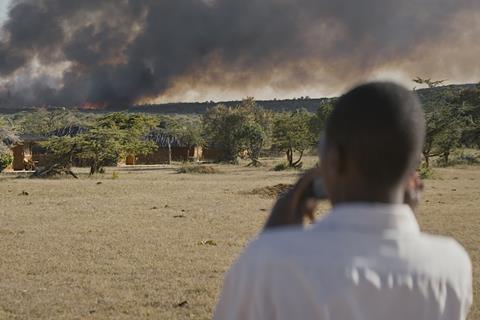Doc follows a 13 year-old boy’s quest to track down the murderers of his father in Kenya’s Laikipia county

Dirs: Nicole Gormley, Debra Aroko. Kenya/US. 2024. 80 mins.
On October 15, 2019, Stephen Ali Apetet, a father of five who worked as a guide in Kenya’s Laikipia Nature Conservancy, was shot and killed while taking two people on a tour. His wife Lucy and their children were left not only grieving, but with barely a scrap of information about how these tragic events had unfolded. It’s a situation that led his 13-year-old son Simon, an aspiring journalist, to try to find out the truth.
Simon’s central presence does make this complex subject accessible
Simon is given his own camera by two debut directors, Nicole Gormley from the US and her Kenyan co-director Debra Aroko (who originally worked as a translator on the film). His personal search for answers proves to be the starting point for a documentary that opens out into a wider consideration of the conflicts that exist over land in Kenya, often as a result of its colonial heritage and further exacerbated by climate change. ’Amani’ is the Swahili word for ‘peace’, which is something this film suggests is in short supply – largely thanks to a catastrophic drought.
Simon’s journey over the next four years provides an emotional hook for audiences, and is likely to secure further festival play after Tribeca and Raindance. Yet, Searching For Amani is often torn between showing the youngster’s perspective and the wider overview of his surroundings, so that the sociological and historical context is simplified. Those looking for a deeper dive into these particular issues might prefer Daphne Matziaraki and Peter Murimi’s documentary The Battle for Laikipia, which is also making its way around the festival circuit after premiering at Sundance.
That said, Simon’s central presence does make this complex subject accessible for younger audiences. Although living in the greener south of Laikipia county, he goes to boarding school near the conservancy which, he explains, is one of the few places where those from farming backgrounds and those with pastoral heritage come together without friction. The conservancy, once owned as a ranch by British colonists, is now run as a nature reserve by Italian Kuki Gallmann and her daughter Sveva, nicknamed Makena.
Simon has a quiet determination as he starts to explore the issues facing the pastoralists due to the drought in the north. This includes learning about what happened to the family of his best mate Haron, while also continuing his pursuit of witnesses who were with his father on the day he was killed.
Where other recent films, including Mediha, have found strength in empowering their young protagonists to use their cameras as an outlet, the eventual shift away from Simon’s hunt for the truth does Searching For Amani no favours in terms of its focus. It begins to gallop over more complex terrain, including conflict between the land-owning whites and the indigenous pastoralists who have been barred from grazing on the conservancy for reasons that are never fully explained. Resulting violence is hinted at, rather than explored. The filmmakers are also at pains to note the impact of climate change and growing populations who are trying to support their families and ever larger herds on increasingly desiccated land.
That multi-pronged approach makes it hard to gauge how much time is passing between the various interviews with those who knew something about the day of the murder – including Makena, one of the conservancy rangers and a tourist. The directors also have a tendency to reach for dramatics. An overheated score from David Naroth, Monica Sonand and David Fleming leans towards thriller elements and there are gauzy reimaginings of the fateful day Stephen died which, though visually polished, border on the manipulative and add little of journalistic substance. Better is the occasional use of watercolour animated maps, which help to illustrate the geography of the area.
Simon realises that he is uncovering more questions than answers, but it is to his credit that he sees tackling difficult questions as a worthy pursuit in itself. And while working so many different angles all at once might not always come off for Gormley and Aroko, their open-mindedness is also an asset.
Production companies: Backroads Pictures, Nicole Gormley Films
International sales: Autlook welcome@autlookfilms.com
Producers: Peter Goetz, Mungai Kiroga, Nicole Gormley, Caryn Capotosto
Cinematography: Campbell Brewer, Nicole Gormley, Simon Ali
Editing: Tessa Malsam, Davis Coombe
Music: David Naroth, Monica Sonand, David Fleming
























